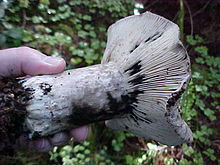Russula albonigra
| Russula albonigra | |
|---|---|

| |
| Scientific classification | |
| Domain: | Eukaryota |
| Kingdom: | Fungi |
| Division: | Basidiomycota |
| Class: | Agaricomycetes |
| Order: | Russulales |
| Family: | Russulaceae |
| Genus: | Russula |
| Species: | R. albonigra
|
| Binomial name | |
| Russula albonigra | |
| Russula albonigra | |
|---|---|
| Gills on hymenium | |
| Cap is convex or infundibuliform | |
| Hymenium is decurrent | |
| Stipe is bare | |
| Spore print is white | |
| Ecology is mycorrhizal | |
| Edibility is unknown | |
Russula albonigra, commonly known as the blackening russula,[1] is a member of the genus Russula, all of which are collectively known as brittlegills. It grows under both hardwood and conifer trees.[1]
Taxonomy[edit]
First described by the mycologist Julius Vincenz von Krombholz in 1838, its specific epithet comes from Latin albus and niger, which mean white and black.
Description[edit]
The cap is convex to infundibuliform, whitish, sticky. The stipe is dusky, or white above, pale grey-ochreous towards the base. The gills are decurrent, crowded, thick, unequal, connected by veins, dusky whitish or yellowish. The flesh is white, turns black or sooty. The taste is somewhat bitter and unpleasant to mild.[2]
See also[edit]
References[edit]
- ^ a b Thiers, Harry D.; Arora, David (September 1980). "Mushrooms Demystified". Mycologia. 72 (5): 1054. doi:10.2307/3759750. ISSN 0027-5514.
- ^ Synopsis of the British Basidiomycetes. p. 281.
